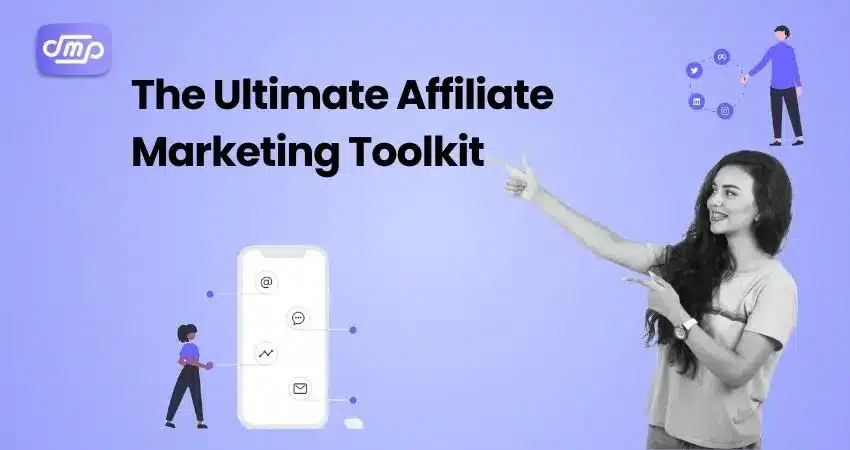
- June 26, 2024
- Digital Marketing, UI/UX design
Table of Contents
For every visitor or customer that an affiliate brings in as a result of their marketing efforts, a company that uses affiliate marketing pays one or more affiliates.Affiliate marketing is a performance-based marketing technique. This kind of internet marketing involves a business offering incentives to independent publications (affiliates) in exchange for their traffic or leads promoting the business’s goods and services.
The Following is How Affiliate Marketing Typically Works:

- Establishing an Affiliate Programme: A company can establish an affiliate programme on its own or via an affiliate network. Under this programme, the company gives affiliates special tracking links or coupon codes to use in promoting the business’s goods and services.
- Affiliate Marketing: Affiliates market the business’s goods and services via a range of online platforms, including blogs, websites, social media, email newsletters, and YouTube channels. They like YouTube channels, blogs, websites, email newsletters, and social media. They include the tracking URLs or coupon codes that the business sends in their advertising materials.
- Visitor Clicks or Leads: An affiliate’s unique identification is recorded using cookies, pixels, or other tracking mechanisms when a visitor clicks on the affiliate’s tracking link or uses the affiliate’s promo code to complete a purchase. As an alternative, affiliates who generate leads—such as sign-ups or form submissions—may be paid a commission through lead-based affiliate programmes.
- Commission Earned: The affiliate receives a commission when a visitor completes a desired activity, such as buying something or registering for a service. The compensation plan may be based on a set sum per lead or sale, a percentage of the sale price, or other variables, depending on the affiliate program.
- Payment and Tracking: The affiliate programme keeps track of the commissions earned by affiliates as well as their referrals. Affiliates are usually paid via bank transfer, cheques, or other means on a regular basis—either monthly or upon reaching a predetermined payment threshold.
All parties who participate in affiliate marketing gain:
- Businesses: It’s a cost-effective marketing strategy because they may reach a larger audience and only pay for tangible outcomes.
- Affiliates: By receiving compensation for endorsing goods and services that suit their target market, they can make money from their web presence and marketing initiatives.
- Customers: They frequently take advantage of exclusive discounts or offers supplied by affiliates, and they may learn about new goods or services through dependable affiliate recommendations.
In general, affiliate marketing is a win-win situation for both parties. Businesses use affiliates’ marketing efforts to generate leads or sales, while affiliates receive compensation for their advertising.
Important Aspects of Affiliate Marketing

Influencer and affiliate marketing appear to have bright futures, with several aspects influencing their development:
Personalization: There’s been a rise in personalisation in influencer and affiliate marketing. Influencers are crafting their material to connect with their followers more deeply, and advertisers are concentrating more on targeting specific demographics. As organizations look to build genuine ties with customers, this trend is probably going to continue.
Affiliates can provide customised material that appeals to particular audience segments, such as blog entries, videos, or social media posts. Higher engagement and conversion rates can result from this content’s ability to speak to the particular needs, interests, or problems of certain user groups. Affiliates can more precisely target their promotions by utilising segmentation techniques and data analytics. Affiliates can focus promotions or offer to users who are most likely to be interested in particular goods or services by examining user behaviour and preferences.
Dominance of Video Content: On social media platforms, video content is still becoming more and more popular. Influencers are taking advantage of this trend by making interesting videos that highlight goods and services. To draw in their target audience, brands are probably going to invest more money in influencer and affiliate marketing strategies that include videos.
AI and Data Analytics: These two fields are transforming the way affiliate and influencer marketing operations are run. With the use of these tools, marketers may find the most pertinent influencers, monitor the real-time performance of their campaigns, and improve their tactics. More advanced and effective affiliate and influencer marketing efforts are to come as AI and data analytics capabilities develop.
AI systems are able to forecast a customer’s future worth by analysing their past activities and interactions with affiliate marketing efforts. In order to optimise long-term profitability, advertisers should better manage resources and prioritise their marketing efforts by identifying high-value clients.
To optimise campaign performance, AI-driven optimisation algorithms dynamically modify bidding strategies, ad placements, and targeting settings based on real-time data analysis. By allowing advertisers to respond swiftly to shifts in user behaviour and market conditions, real-time optimisation guarantees the best possible campaign results.
With the help of artificial intelligence (AI) and data analytics, affiliates and advertisers can now make data-driven decisions, maximise campaign success, and provide users with more tailored and relevant experiences, all of which will increase user engagement and affiliate marketing conversions.
Extended Collaborations: Companies are realising the importance of extended collaborations with influencers. Many firms are developing long-term partnerships with influencers in place of one-time sponsored postings in order to gradually win the audience’s confidence and loyalty. Long-term collaborations can improve a brand’s return on investment and provide more genuine content.
Regulatory Shifts: There is a growing regulatory focus on affiliate disclosures and influencer marketing. Consequently, in order to preserve openness and trust with their audience, companies and influencers will need to make sure that regulations are followed. This might entail more openness regarding sponsored material and more transparent disclosure policies.
Changes in affiliate marketing regulations are a reflection of the increased focus on openness, consumer privacy, and moral advertising. To retain compliance and customer trust, affiliates and advertisers need to keep up with changing legislation and modify their activities accordingly.
Platform Diversification: Although YouTube and Instagram have long been well-liked venues for influencer marketing, there is currently a shift in the types of platforms available. The future of influencer and affiliate marketing will be greatly influenced by up-and-coming platforms as companies look for new methods to connect with consumers and reach new markets.
Social media: To advertise goods and services, affiliates are using social media sites like Instagram, Facebook, Twitter and Pinterest more frequently. In order to highlight affiliate items and increase conversions, social media influencers produce interesting material like sponsored posts, articles, videos, and live streams.
YouTube and Video Content: In order to promote affiliate items, affiliates are producing product reviews, tutorials, unboxing videos, and other forms of video content. Video content has grown to be a dominant force in affiliate marketing. Affiliates can use visual storytelling to connect and interact with audiences on YouTube and other video-sharing websites like Twitch and TikTok.
Email Marketing: For affiliate marketers looking to connect with their audience and advertise affiliate goods and services, email marketing is still a useful tool. Using the power of individualised and targeted communications, affiliates employ email newsletters, product recommendations, and exclusive offers to increase traffic and conversions.
Podcasts and Audio Content Affiliates are looking into ways to use audio content and podcasts to market affiliate goods and services to their listeners. Audio storytelling, podcast sponsorships, endorsements, and product placements give affiliates a special opportunity to interact with listeners and encourage conversions.
Mobile applications and in-app advertising: Affiliates are using mobile applications and in-app advertising to reach users on smartphones and tablets as a result of the growing popularity of mobile devices. Through in-app banners, interstitial advertisements, and other means, affiliates can advertise affiliate products.
Via in-app banners, interstitial adverts, native ads, and sponsored content inside of mobile apps across multiple categories, affiliates can advertise affiliate products.
Online communities: Affiliates focus on speciality platforms and online communities that serve certain interests, pastimes, sectors of the economy, or target audiences. Affiliates may interact with highly engaged audiences and market affiliate items in a more contextualised and targeted way by finding and joining relevant niche communities.
New Platforms and Technologies: In order to be creative and stand out from the competition in their affiliate marketing campaigns, affiliates are investigating new platforms and technologies like voice search, augmented reality (AR), virtual reality (VR), and smart home appliances. Through immersive and dynamic experiences, these new platforms give affiliates additional ways to communicate with users and encourage sales.
Conclusion
All things considered, the future of influencer and affiliate marketing looks promising, propelled by shifting consumer tastes, technology breakthroughs, and the increasing significance of real, tailored brand encounters.
Platform diversification in affiliate marketing helps affiliates reach a wider audience, interact with them through a variety of touchpoints, and adjust to changing online consumer tastes and behaviors. Affiliates may maximize their earning potential in the affiliate marketing ecosystem and optimize their marketing strategy by utilizing a wide range of platforms and channels.











